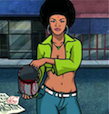|
New sticky topic for a new month. This topic was submitted by a user via PM, who can claim credit if they wish. edit: see poll, only visible on browser! Please tell us about your favorite BFC-related book, past or present! That is, no random unrelated fictional literature like Harry Potter. But finance-plot fiction is ok, as is BFC-related nonfiction. Tell us why you think the book is great! After we have some sort of critical mass of names, I'll pick some and add a SA thread poll for people vote on their favorites. I'll start with a classic. Michael Lewis, Liar's Poker.  Lewis is a gifted writer which made this fun to read, and of course 1980s Wall Street stories are crazy. But within all that, he also gives a very educational history of the mortgage bond market. I had no idea going in that mortgage backed securities were basically invented in the '80s, and while I knew a bit about bonds before I read it, I gained a better appreciation for their pricing and trading through the book. While I also knew the S&L crisis in the '80s was "a thing", he explains how it all came about. Anyway, great book that deserves all the praise heaped on it over the years. Also, even if Wall St is a little more politically correct these days -- people don't change. The greed in this book is just reflected in different ways by Wall St in more recent decades. pmchem fucked around with this message at 04:55 on Mar 22, 2023 |
|
|
|

|
| # ? May 2, 2024 04:47 |
|
Reminiscences of a Stock Operator celebrates its 100th anniversary this year, and although there's a lot of obsolete cruft in it (certain tactics mentioned throughout the book are literally illegal today), no other book has better nailed the psychology of successful trading. There's a lot of wisdom in there about tips, "playing your own hand," and when to cut and add positions.  I don't actually recommend active trading to anyone, but if, like me, you're going to do it anyway, you should read this.
|
|
|
|
A random walk down wall street. Nice casual book, but filled with meaningful information
|
|
|
|
I'm gonna go more dry. Yossi Sheffi is an amazing professor, has been really working to drag the supply chain profession forwards. "The Power of Resilience" was out well *before* the pandemic hit. Advocating for better and more comprehensive supply chain mapping, putting in work to identify critical bottlenecks in the lower tiers (your supplier's suppliers' supplier), get better communication and detection systems in place, improve collaboration , and of course build in resiliency - in multiple ways, not just by giving lip service to double sourcing a few items. If you ever have a chance to hear him speak, take it! Auction optimization :chefs kiss:
|
|
|
|
 I'd go with the Four Pillars of Investing by Bill Bernstein. It's the best all around book on investing that I've read so far. The author has an easy to read style, and makes good use of historical examples to illustrate his points. The book covers a lot of topics in enough depth to allow for decent comprehension without getting bogged down. It gives all the tools necessary to build a good buy and hold portfolio, and successfully manage it afterwards. I've read a lot of good books on finance over the years, but this book has by far had the largest influence on my investing.
|
|
|
|
Four Pillars is great. If you want someone not financially savvy to get started, I would recommend: The Investment Answer since it's very similar but way way shorter. And for young beginning investors the free pdf of If You Can by William Bernstein which is now published as a book so it totally counts.
|
|
|
|
What I Learned Losing a Million Dollars: There are no shortage of books by successful people explaining the stories they tell about how they got successful, but that's never the full story. Here's something by a guy who made it big, lost it all, and understands what went wrong. The Money Formula: Paul Wilmott is largely responsible for the rise of quantitative finance in the past three decades and he's less than thrilled with how it's turned out. This is his critical introduction to the field and its shortcomings. Against the Gods: This is my favorite non-fiction book of all time and it's arguably finance-related so it goes here. The author lays out the case that understanding that we can predict the future and take steps to mitigate risks is really the foundation of modern society. Fooled by Randomness: Nassim Nicholas Taleb is a crank now but this book was written before he fell down that path and it's good. He's still a little obnoxious but this is the clearest explanation of probabilistic thinking that I've seen.
|
|
|
|
Fourier Series posted:A random walk down wall street. Nice casual book, but filled with meaningful information I came here to say this book. Like you said, itís pretty casual but I think it was the first real investing type book I read and had a lot of fun with it.
|
|
|
|
ultrafilter posted:Fooled by Randomness: Nassim Nicholas Taleb is a crank now but this book was written before he fell down that path and it's good. He's still a little obnoxious but this is the clearest explanation of probabilistic thinking that I've seen. I'll echo this, it's quite good. Taleb is a bit of a lunatic but it mostly was expressed in fairly harmless ways.
|
|
|
|
moana posted:And for young beginning investors the free pdf of If You Can by William Bernstein which is now published as a book so it totally counts. Was coming to post this. I've only gotten through the first 9 pages because I stopped to read Common Sense on Mutual Funds before continuing but life happened and that was four years ago. Instead, I read The Big Short instead because I had it in paperback and I had jury duty. That book is pretty good, pretty fun, but I had already seen the movie which I loving loved to pieces. If You Can, and by extension The Millionaire Next Door had a huge influence on me. It's been a while, but this is how I remember it. I was finance-curious around the subprime mortgage crisis, partially from conversations with a friend who is a Michael Lewis fan. What I took from it was an assessment of capitalism from a practical, individual perspective. It's not "Capitalism rules/sucks" but "This is capitalism. What can you for yourself regarding it?" It talks plainly about the simple practical matter of the value of earning more money without puritanical reservations or perverse capital worship. It talks about the importance of investing and the corrosiveness of consumption but it's also not about moralization. It shows the capitalist system for what it is and explains how to attempt to thrive within it practically. It even talks about certain limits of what can be gleaned from these interviews with millionaires and the survivorship bias, in that just because almost all of these people own their own business that doesn't mean that creating a business is the correct way to do it. Maybe I was just an easy mark and if I'd been told to read The Secret, I'd be saying the same positive stuff about that. I don't think TMND is perfect or for everyone. I was likely primed for its message because I have never been much of a consumption or status minded person, and I was undergoing a large life change around the time I read it. I also think that the framing within If You Can is helpful because it does more empathetically talk about how later generations might not have quite the same opportunities as a bunch of Boomers and Gen Xers did, so you can take it with a grain of salt while still hopefully obtaining something useful out of it. Finally, you need to tiptoe around a few early chapters where it reads like an excerpt from The Bell Curve, so stick with it until you get past the poo poo about 'Russians making the best horse traders' and other oddities best left in the 90s. Man, this thread reminds me I have a list of like 50 books, mostly finance nonfiction, that I've accumulated over the years. The only other one I've gotten off the list is Attack of the 50 Foot Blockchain which needs no introduction. It's great.
|
|
|
|
Anyone else read White Trash by Nancy Isenberg? https://www.amazon.com/White-Trash-400-Year-History-America/dp/0143129678/ It really changed how I viewed the formation of the US. It underscores how lovely it has always been to be poor. Any discussion of how lovely indentured servitude or poor white immigrants were (and are) treated has traditionally been preempted by the horrors of slavery in America. Which meant the long history of how shittily rich white people have treated poor white people has been largely overlooked. Itís an interesting but dense read and Iím wondering if anyone else from BFC has read it and what their thoughts are in the context of this subforum.
|
|
|
|
KYOON GRIFFEY JR posted:I'll echo this, it's quite good. Taleb is a bit of a lunatic but it mostly was expressed in fairly harmless ways. The Black Swan is the last of his non-technical books that I'd recommend, and you can see the self-aggrandizement starting to take over in that one. It's still worth reading, but you're probably going to feel more like slapping the speaker. His technical work was good for a bit after that, but he's really started slipping there too. It's a shame; he really was among the best in the business for a while, and if he could've reined in his ego I think he could've stayed on top for a while.
|
|
|
|
Dik Hz posted:Anyone else read White Trash by Nancy Isenberg? Which reminds me, one of the most fascinating books about the history of finance in America was The Color of Money - I suggested it for my book club and though it was dense, it was very useful and something I'd never learned about except briefly. https://www.amazon.com/Color-Money-Black-Racial-Wealth/dp/0674970950
|
|
|
|
I plan to put up the poll this week -- if anyone has an entry, please add it soon
|
|
|
|
Is the poll for favorite book or something akin to a book club we all read and discuss?
|
|
|
|
Dik Hz posted:Is the poll for favorite book or something akin to a book club we all read and discuss? drat that's a good question. I was gonna do fav book, but we probably all haven't read enough of the same things. maybe it should be "book you'd like to read next?" I don't think running a book club is gonna happen here (at least not by me) but someone else is welcome to run with that torch (make a thread,  ) )
|
|
|
|
It's more estate planning/BWM themed, but I will never not pimp Beyond the Grave. It is a treasure trove of instructive family squabbles, even if the estate planning advice is long obsolete.
|
|
|
|
Poll added to thread, it's multiple choice. Poll is for book(s) to (re)read next, not "favorite" book. Forward-looking instead of backward-looking! Have fun.
|
|
|
|
Is there a way to see the poll on mobile or am I just functionally a Luddite?
|
|
|
|
Dik Hz posted:Is there a way to see the poll on mobile or am I just functionally a Luddite? AFAIK the iOS app doesnít show polls. Gotta log in via browser I guess?
|
|
|
|
Voted for Random Walk as it's probably time to read it again. If I was going to recommend something BFC-related (although more B/C than F) I think it would be Graeber's Bullshit Jobs: A Theory and The Utopia of Rules: On Technology, Stupidity, and the Secret Joys of Bureaucracy because both articulate what many of us feel and experience while also being fairly entertaining. Order doesn't really matter, but Bullshit Jobs might be the better lead-in. FreelanceSocialist fucked around with this message at 21:52 on Mar 20, 2023 |
|
|
|
Is it too late for recommendations? Because I have two. These were both books I read during my time in undergrad and both do a pretty good job with their subject matter. Economism: Bad Economics and the Rise of Inequality James Kwak  This is practically biblical text for me. I was already well primed for its message before finding it on the reading list of my senior capstone class, as I'd always been something of a contrarian with regards to the assumptions made in undergraduate economics courses. Kwak has the "frictionless vacuum" of Econ 101 square in his sights with this text covering how the assumptions taught in these courses--which are often required for anyone studying anything 'business' related--lead to bad economic decision making, blind us to the complexities inherent to social systems like economies, and thus prevent us from addressing issues like inequality (even if we wanted to). I've stopped short of keeping a few copies of this book on hand to give out to any poor unfortunate soul who finds their way into such classes. And yes, I do realize the irony of calling a text that makes a direct comparison between economics and religion 'biblical.' It's my short description, I get to choose the wording. Austerity: The History of a Dangerous Idea Mark Blyth  This book tackles the hammer "fiscal conservatives" are always reaching for in times of crisis--austerity. I don't hear too much talk about austerity directly anymore, but the ideas behind it are still alive and well, despite ample historical evidence that austerity just makes things worse. Blyth lays out the case for this in his book, taking the time to both define austerity for those who don't know (or think they know) and lay out all the evidence in history telling us that this is a dumb idea every time it is tried. Both of these books would be rather... topical given recent headlines.
|
|
|
|
Top 3 vote getters (posting for mobile folks who can't see poll), in order, are: Liar's Poker Fooled By Randomess The Four Pillars of Investing thanks for contributing, all, and please feel free to continue the discussion; this thread will be unpinned soon.
|
|
|
|

|
| # ? May 2, 2024 04:47 |
|
Im excited to read these books 
|
|
|



























